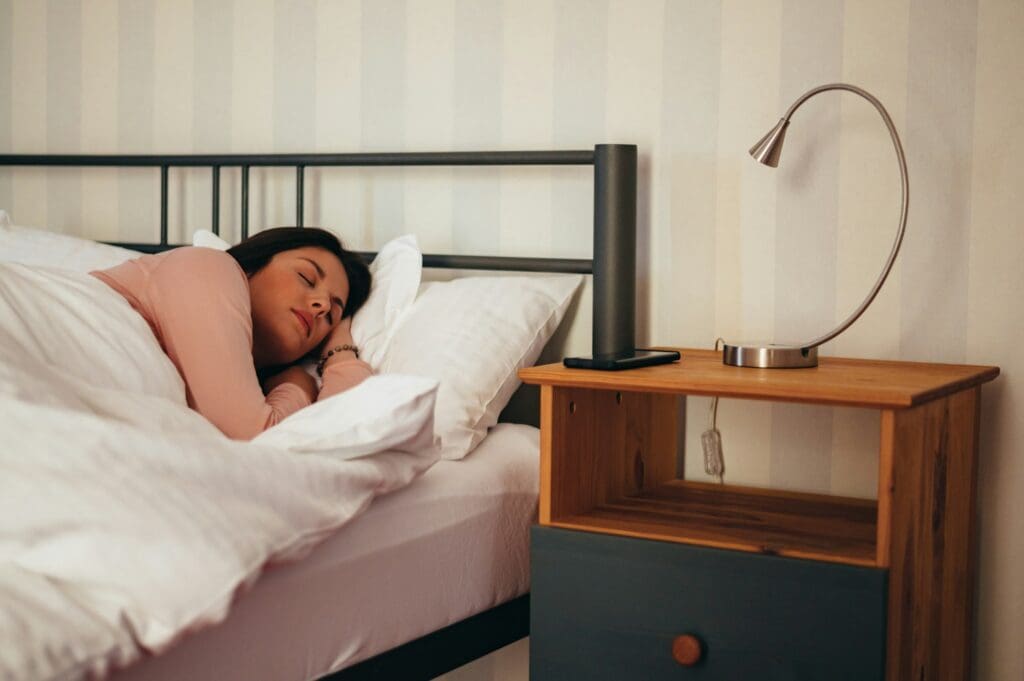


Struggling to wake up refreshed despite spending enough hours in bed? You’re not alone. Many people face this challenge every night. Quality sleep is essential for good health and well-being, yet achieving it can often feel elusive.
But don’t worry—there are practical steps you can take to improve your sleep and wake up feeling rejuvenated.
“A good laugh and a long sleep are the best cures in the doctor’s book.” — Irish Proverb
From creating the perfect sleep environment to adjusting your daily habits, we’ve got you covered. Let’s dive into some research-backed strategies that can help you achieve better sleep starting tonight.

Improving sleep quality starts with establishing consistent sleep habits. Aim to go to bed and wake up at the same times every day, even on weekends.
This helps regulate your body’s internal clock and can make falling asleep and waking up easier.
Additionally, create a relaxing bedtime routine. Engage in calming activities like reading a book, taking a warm bath, or practicing gentle yoga.
Avoid stimulating activities such as intense workouts or browsing social media, as these can interfere with your ability to wind down.
Your sleep environment is equally important. Optimize your bedroom for sleep by ensuring it’s cool, dark, and quiet. Invest in a comfortable mattress and pillows. Consider blackout curtains or a white noise machine if you are sensitive to light and sound.
Another key factor is to limit exposure to screens before bedtime. The blue light emitted by phones, tablets, and computers can interfere with your body’s production of melatonin, the hormone that helps regulate sleep.
Try to turn off all electronics at least an hour before you sleep.
Eating and drinking habits can impact sleep quality as well. Avoid large meals, caffeine, and alcohol close to bedtime. These can disrupt sleep or make it harder to fall asleep.
Furthermore, incorporate physical activity into your daily routine. Regular exercise can help you fall asleep faster and enjoy deeper sleep. Just be mindful to not exercise too close to bedtime, as this can have the opposite effect.
Finally, manage your stress levels. Techniques such as meditation, deep breathing, and mindfulness can help you relax and prepare for a good night’s rest.
Keeping a journal to jot down any worries or to-do lists can also keep your mind from racing when you hit the pillow.
By taking these steps, you can improve both the duration and quality of your sleep, leading to a more refreshed and energized feeling every morning.
We all know that sleep is essential, but achieving a restful night can sometimes feel elusive. Whether you’re struggling with falling asleep or waking up in the middle of the night, adopting certain habits can make a significant difference.
Here’s a look at some practical tips to help you sleep better and wake up feeling refreshed.
Waking up refreshed is the cherry on top after a night of quality sleep. Imagine starting your day feeling vibrant and ready to face the world! Here’s how you can make that vision a reality.
Incorporating these habits into your morning routine can significantly enhance how refreshed you feel throughout the day. Small, intentional changes go a long way in setting a positive tone from the moment you wake up!

Sticking to a consistent sleep schedule is more important than you might think. By going to bed and waking up at the same time each day, you can help regulate your body’s internal clock.
This means not just weekdays, but weekends too – though allowing for a slight variation is acceptable. Your body loves routine, and establishing a consistent schedule can help you fall asleep faster and wake up refreshed.
Start by determining the amount of sleep you need to feel rested – typically seven to nine hours for most adults. Once you have that number, work backward from your wake-up time to establish your bedtime.
For instance, if you need to wake up at 7 AM and require eight hours of sleep, your bedtime should be around 11 PM.
Creating a pre-sleep routine is also beneficial. Winding down activities, such as reading a book, taking a warm bath, or practicing meditation, signal to your brain that it’s time to get ready for sleep.
Consistency is key here, too. Performing these activities in the same order each night helps carve out a path towards better sleep.
Remember to be patient with yourself. If it takes a while to establish a new schedule, don’t get discouraged. Small, incremental changes can lead to long-term improvements in your sleep quality.
Stick with it, and soon enough, your body will adapt, and you could find yourself waking up more refreshed than ever before.
Daytime naps, especially those that extend beyond an hour or occur later in the afternoon, can disrupt your nighttime sleep pattern.
While a short nap may recharge your energy temporarily, excessive or poorly timed naps can make it harder to fall asleep at night.
This happens because napping during the day reduces sleep pressure, the biological drive to sleep that builds up throughout the day.
Set boundaries: If you feel the need to nap, try to keep it under 30 minutes and schedule it earlier in the day. A brief nap in the early afternoon can be rejuvenating without causing nighttime sleep disruptions.
However, if you consistently struggle with night sleep, it might be best to avoid naps altogether until your nighttime sleep stabilizes.
Make your bed a sleep-only zone: Ensure that your bed is reserved strictly for sleep and intimate activities.
Using the bed for reading, watching TV, or any other activity can weaken the association between your bed and sleep, making it harder to fall asleep when you need to.
Creating these boundaries helps signal to your body that it’s time to wind down once you hit the sheets.
Monitor and adjust: Pay attention to how your naps—or lack thereof—affect your sleep quality at night. It might take a bit of trial and error to find what works best for you.
Keep a sleep journal to track your bedtime, wake-up time, and any naps taken during the day. This can help you identify patterns and make informed adjustments to your routine.
Remember, consistency is the key. By managing your naps smartly, you’re taking an important step towards better sleep hygiene and ensuring you wake up refreshed and ready to tackle the day.
We all enjoy a good cup of coffee, but it’s crucial to be mindful of when we consume it. Caffeine is a powerful stimulant, and drinking it too late in the day can keep you tossing and turning at night.
Aim to finish your last cup at least six hours before bedtime. This timing helps ensure that the stimulating effects wear off by the time you’re ready to hit the sack.
It’s not just coffee you need to watch out for; other sources of caffeine include tea, soda, chocolate, and even some medications. Check labels and consider switching to caffeine-free alternatives in the afternoon and evening.
Besides caffeine, alcohol is another culprit disrupting your sleep quality. While a nightcap might make you feel drowsy initially, alcohol can interfere with your sleep cycle, leading to fragmented and less restorative sleep.
It’s best to avoid alcoholic beverages close to bedtime to ensure uninterrupted slumber.
Lastly, consider your evening meals. Large, heavy, or fatty meals can cause discomfort and indigestion, making it tough to drift off. Try to have your dinner at least two to three hours before bed and opt for lighter, well-balanced meals.

When it comes to improving your sleep naturally, a variety of supplements and techniques can help. One popular option is melatonin, a hormone your body naturally produces to regulate the sleep-wake cycle.
Taking melatonin supplements can be particularly useful if you have an erratic sleep schedule, like when dealing with jet lag or shift work.
Another potent sleep aid is magnesium. This essential mineral helps to calm the nervous system and can be found in foods such as nuts, seeds, and leafy green vegetables.
Some people prefer magnesium supplements to ensure they’re getting enough of this nutrient.
Herbal remedies like valerian root, chamomile, and passionflower have also been used for centuries to promote relaxation and better sleep. These can be taken in various forms, such as teas, tinctures, or capsules.
In addition to supplements, aromatherapy can play a significant role in enhancing your sleep environment. Essential oils like lavender and cedarwood are known for their calming properties.
Using an essential oil diffuser or applying a few drops to your pillow can create a soothing atmosphere conducive to sleep.
Remember, it’s essential to consult with your healthcare provider before starting any new supplement regimen.
They can offer guidance based on your specific needs and ensure that any natural sleep aid won’t interact with other medications you may be taking.
Kicking off your journey to better sleep can start with a simple step: tracking your sleep patterns. By understanding your current habits, you can pinpoint areas for improvement and make more informed adjustments.
A popular tool for this is a sleep diary.
What is a Sleep Diary? It’s essentially a log where you record various aspects of your sleeping habits such as your bedtime, wake-up times, naps, exercise routines, alcohol or caffeine intake, and medications.
Keeping a consistent record gives you and your healthcare provider valuable insights.
Many find that tracking these details reveals patterns they weren’t initially aware of. For instance, you might notice that on days you drink caffeine late, falling asleep becomes a challenge. This awareness lets you modify your habits wisely.
How to Get Started:
If tracking reveals persistent issues, don’t hesitate to consult a healthcare professional. Sometimes, underlying conditions could be affecting your sleep quality, and a doctor can provide targeted advice or treatment.
Remember, small steps can move you toward better sleep hygiene. Start by observing your patterns, understand them, and gradually implement changes for a more restful night.
Deep sleep is essential for physical and mental recovery. To achieve deep sleep every night, start by creating a consistent sleep schedule. Go to bed and wake up at the same times every day, even on weekends.
Additionally, engage in relaxing activities before bedtime, such as reading, taking a warm bath, or practicing meditation. Make sure your bedroom environment is conducive to sleep—keep it cool, dark, and quiet.
Finally, avoid heavy meals and limit caffeine and alcohol consumption in the hours leading up to bedtime.
Yes, several natural remedies can help improve sleep. Herbal teas like chamomile, valerian root, and lavender are known for their calming effects. Magnesium supplements can also promote relaxation and improve sleep quality.
Additionally, practicing mindfulness techniques such as meditation or deep-breathing exercises can help reduce stress and prepare your body for sleep.
Aromatherapy with essential oils like lavender or eucalyptus can also create a relaxing sleep environment.
Your room environment significantly impacts your sleep quality. A quiet, cool, and dark room creates the optimal conditions for sleep.
Consider using blackout curtains to eliminate external light and earplugs or white noise machines to block out noise. Maintain a comfortable room temperature—usually between 60-67 degrees Fahrenheit is ideal.
Also, ensure your mattress and pillows provide good support; an uncomfortable bed can lead to poor sleep quality. Keeping your room tidy and free of distractions can further create a peaceful environment conducive to sleep.
Caffeine is a powerful stimulant that can interfere with your ability to fall asleep and stay asleep. Consuming caffeine, even six hours before bedtime, can reduce your total sleep time by up to an hour.
It affects your central nervous system by blocking adenosine, a chemical that promotes sleep. To minimize its impact on your sleep, avoid consuming caffeine in the late afternoon and evening.
Be mindful of hidden sources of caffeine, such as chocolate, certain medications, and some teas.
If you find yourself struggling to fall asleep, waking up frequently during the night, or feeling tired despite getting an adequate amount of sleep, it may be time to improve your sleep habits.
Other signs include irritability, difficulty concentrating, and relying on caffeine to stay awake during the day. Poor sleep habits can also manifest as physical symptoms, such as frequent headaches or a weakened immune system.
If you recognize any of these signs, consider evaluating and adjusting your sleep hygiene practices for better overall health.
Achieving better sleep every night involves a combination of optimizing your environment, establishing healthy habits, and being mindful of what you consume.
By creating a relaxing and clutter-free bedroom, limiting stimulating activities in bed, managing stress, and adhering to a consistent sleep schedule, you can significantly improve your sleep quality.
Additionally, paying attention to your diet, the timing of your meals, and your exposure to natural light during the day also plays a crucial role.
Remember, improving sleep hygiene is a journey and the benefits of quality sleep are well worth the effort.
So, start making these small changes today, and before long, you’ll likely find yourself drifting into a restful sleep each night and waking up feeling refreshed and ready to take on the day!









